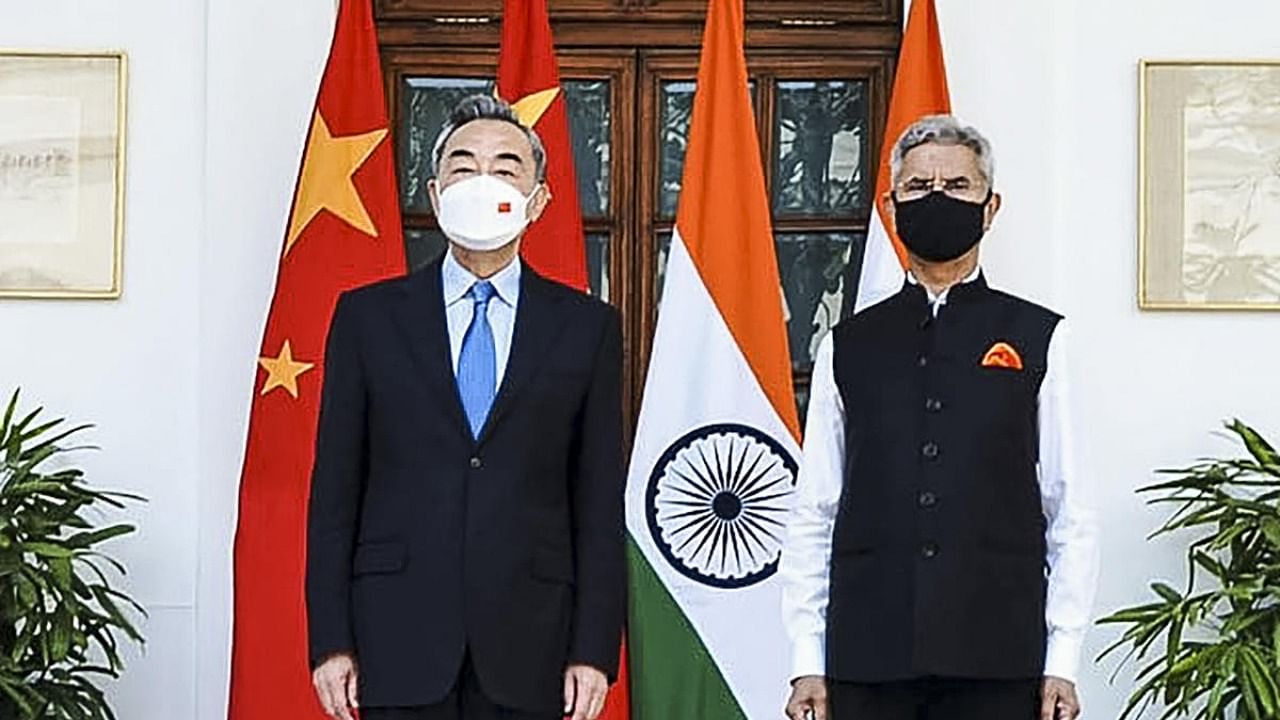
The relations between the two nations cannot be 'normal' unless China withdraws unusually large number of soldiers it deployed along its Line of Actual Control (LAC) with India in eastern Ladakh since April-May 2020, External Affairs Minister S Jaishankar told Chinese Foreign Minister Wang Yi.
Wang arrived in New Delhi late on Thursday and met his counterpart Jaishankar and Prime Minister Narendra Modi's National Security Advisor Ajit Doval on Friday.
He, however, did not have a meeting with Modi, as New Delhi politely but firmly turned down his request for an appointment with the Prime Minister.
Wang argued for both sides taking a long-term view of the relations beyond the boundary dispute and conveyed to Jaishankar China's "desire" to return to normalcy in its ties with India.
New Delhi insisted on resolving the stand-off along the LAC first. “I was equally forthcoming that India wants a stable and predictable relationship (with China). But restoration of normalcy will obviously require a restoration of peace and tranquillity (along the LAC),” Jaishankar said after his meeting with Wang.
New Delhi also refrained from committing the Prime Minister's visit to the communist country to attend the BRICS (a bloc comprising Brazil, Russia, India, China and South Africa) summit, which will be hosted by President Xi Jinping later this year.
Wang invited Doval to Beijing to restart talks at the level of the Special Representatives to resolve the boundary dispute between the two nations. The National Security Advisor, however, told the Chinese Foreign Minister and his counterpart in the boundary negotiations that the talks could resume only when the “immediate issues” – the stand-off along the LAC – would be resolved.
“The frictions and tensions that arise from China’s deployments since April 2020 (along the LAC with India) cannot be reconciled with a normal relationship between two neighbours,” the External Affairs Minister said, adding that he was “very honest” in conveying to the Chinese Foreign Minister the “national sentiment” of India.
Jaishankar and Wang discussed not only the two-year-long military stand-off along the LAC and other aspects of the bilateral relations including education, travel and commerce, but also touched on the situation in Afghanistan and Russia-Ukraine conflict. The External Affairs Minister, however, insisted during a news conference shortly after his meeting with the Chinese Foreign Minister that the bilateral relation was not normal because the situation in the border areas continued to be abnormal.
“If you ask me, if our relationship is normal today, my answer to you is no, it is not,” Jaishankar told journalists, adding: “And, it cannot be normal, if the situation in the border areas is abnormal. And, surely the presence of a large number of troops there, in contravention of agreements, is abnormal.”
He noted that negotiations between the two sides had resulted in mutual withdrawal of troops by both sides from some of the face-off points along the LAC, like from Galwan Valley in June 2020, from both banks of Pangong Tso in February 2021 and from Gogra Post in August 2021.
“This needs to be taken forward since completion of disengagement (withdrawal of frontline troops) necessary for discussions on de-escalation (thinning out of additional troops deployed by two sides in rear areas) to take place,” Jaishankar said, describing the negotiations between the two sides as “work in progress, obviously at a slower pace than desirable”.
The 15th round of negotiations between the military commanders of the two nations earlier this month failed to yield the much-expected deal for mutual withdrawal of troops from Hot Springs or Patrol Point 15 in eastern Ladakh.
New Delhi has been accusing China of trying to unilaterally change the status quo by deploying a large number of troops of its People's Liberation Army along its LAC with India in eastern Ladakh and hence, of violating bilateral agreements inked in 1993 and 1996. The stand-off started when Indian Army too mobilised additional troops to prevent the Chinese PLA's bid to push the LAC westward in order to strengthen China's claim on territories of India.
Watch the latest DH Videos here:
